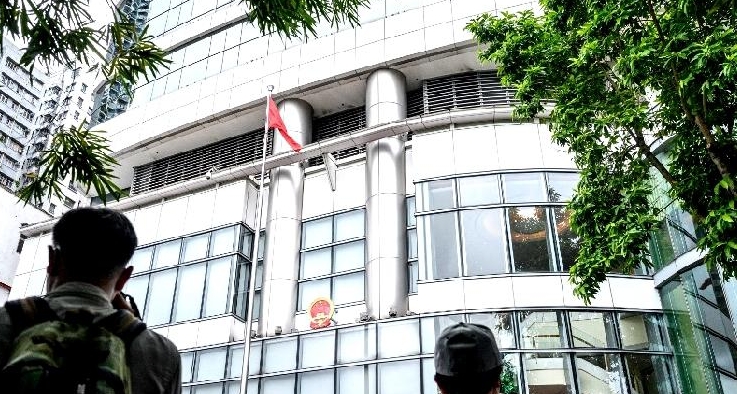By Jerome Taylor and Su Xinqi
HONG KONG, July8 (AFP) — China opened a new office on Wednesday for its intelligence agents to operate openly in Hong Kong for the first time under a tough new security law, in a public display of its tightening control over the finance hub.
The new base is located in a rapidly converted hotel overlooking the city's Victoria Park, a location that has hosted pro-democracy protests for years, including an annual vigil marking Beijing's deadly Tiananmen crackdown.
A plaque bearing the security agency's name was unveiled early Wednesday in front of Hong Kong government and mainland officials — including Beijing's top envoy to the city and the commander of the Chinese army barracks in Hong Kong.
Police blocked roads around the former Metropark Hotel and surrounded it with water-filled barriers. A Chinese flag was unfurled on a pole erected outside the building while a plaque with the national emblem went up overnight.
City leader Carrie Lam — a pro-Beijing appointee — hailed the opening as "a historic moment" and said China's intelligence apparatus would be an "important partner" in helping to safeguard national security.
Luo Huining, Beijing's top envoy to Hong Kong, said the city had "bade farewell to the days when it was defenceless in national security".
Beijing imposed the new law on Hong Kong last week targeting acts of subversion, secession, terrorism and foreign collusion, in response to huge and often violent democracy protests that erupted last year.
The law is the most radical change in Hong Kong's freedoms and autonomy since Britain handed the city back to China in 1997.
Similar national security laws are used to crush dissent on the mainland and police in Hong Kong have already arrested people voicing certain political views now deemed illegal, such as advocating independence or greater autonomy.

Spear tip of security apparatus
The content of the security law was kept secret until it was enacted last Tuesday, bypassing Hong Kong's legislature.
China has said it will have jurisdiction over the most serious cases, toppling the legal firewall that has existed between its Communist Party-controlled courts and Hong Kong's independent judiciary since the handover.
Among many precedent-setting provisions in the law is authorisation for China's security agents to work openly inside Hong Kong, with powers to investigate and prosecute national security crimes.
Until now Hong Kong's own police and judiciary had complete jurisdiction over the semi-autonomous finance hub.
But China argues national security is the responsibility of the central government and says the law is needed to restore stability.
On the authoritarian mainland, China's secret police are the spear tip of a highly efficient and ruthless security apparatus that pursues critics and scrubs the public sphere of dissent.
In his speech, Luo rejected criticism of the mainland legal system, saying "the Chinese mainland has a healthy legal system and a sound environment for the rule of law".
Observers have regularly raised concerns about due process in the country, where the courts have a conviction rate of about 99 percent.
New boss
Last week Beijing appointed Zheng Yanxiong to head up the agency. A party hardliner, Zheng is best known for his involvement in a clampdown against protests across the border in neighbouring Guangdong province.
One of his deputies is Li Jiangzhou, a veteran public security officer who has worked in the Liaison Office, the body that represents Beijing in Hong Kong.
Little is known about the other, Sun Qingye. Last week the South China Morning Post described Sun as a senior official from China's intelligence agency, according to government sources.
The opening of the new office comes little more than a day after Hong Kong announced expanded search and surveillance powers for police investigating national security crimes.
These rules also empower Hong Kong police to order internet takedown notices if posts and comments are deemed to breach national security.
ADVERTISEMENT
ADVERTISEMENT


































